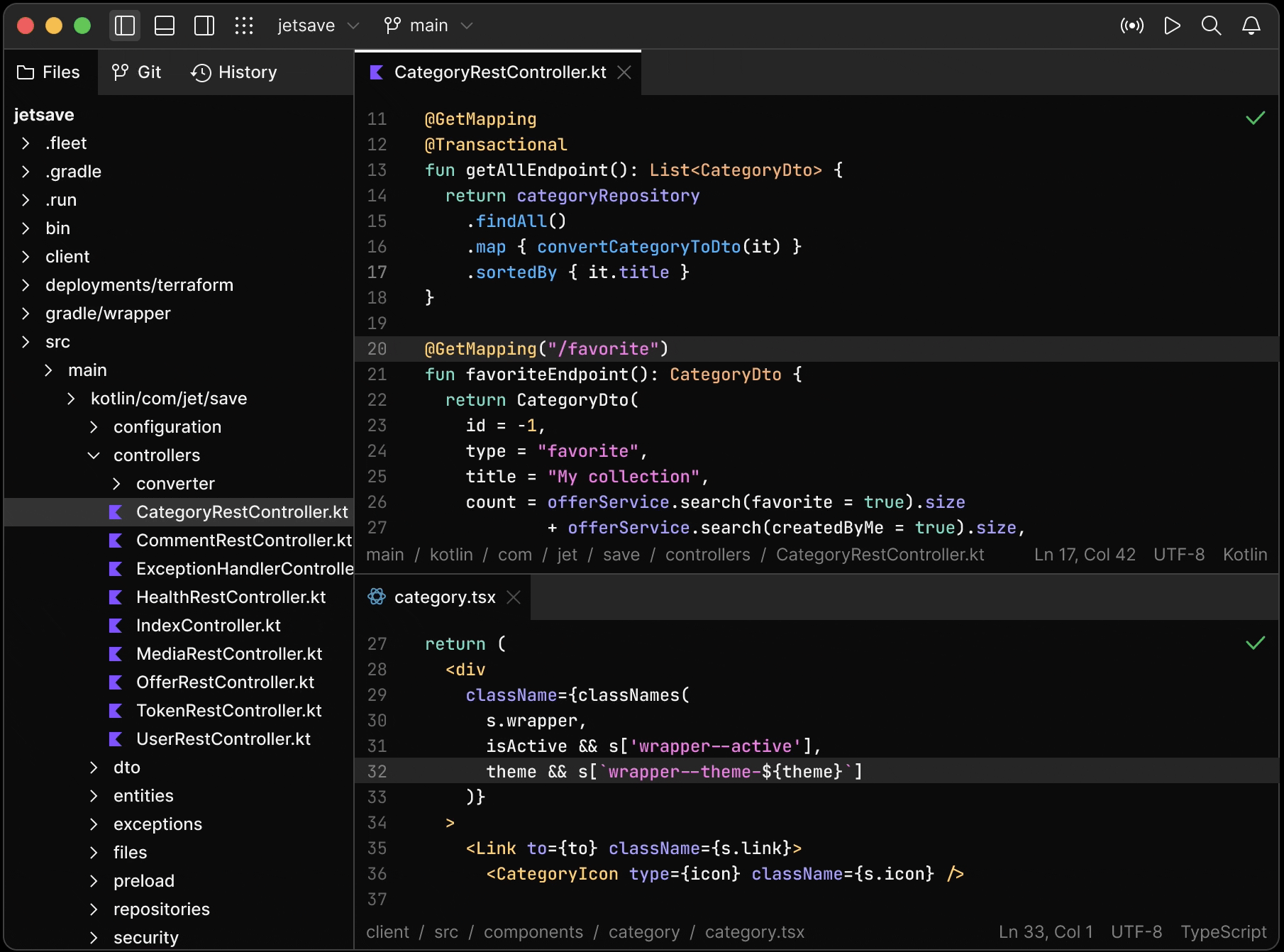技術情報
- 2022年03月28日
- 技術情報
Fleet IDE
“Fleet is also a fully functional IDE bringing smart completion, refactorings, navigation, debugging, and everything else that you’re used to having in an IDE – all with a single button click.” – JetBrains

Fleet takes that approach one step further by making it a single IDE. You no longer have to open another IDE to get the functionality you need for a particular technology. With Fleet, everything is in one app.
Languages include:
- Java
- Kotlin
- Python
- Go
- JSON
- JavaScript
- Rust
- TypeScript
- PHP
- C++
- C#
- HTML
- Ruby
The fleet is built with collaboration in mind. This makes it easy to collaborate on a project, whether it’s local or remote. It provides the ability to work on the same or different files at the same time, run tests, access the device, and do other things you would expect from a collaboration IDE at the same time.
Fleet has a set of integrated tools to help developers enjoy their work and be more productive.
- Terminal
- Git
- Run & Debug
- Navigation
- MultiPlatform
- Themes
- Plugins
- etc.
The fleet’s architecture is designed to support a variety of configurations and workflows. Fleet can only run on your own machine, or you can move some processes to another location like docker , clouds etc.
This IDE also has tons of features and might worth to give it a try.
Yuuma
yuuma at 2022年03月28日 10:00:00
- 2022年03月25日
- 技術情報
素晴らしいHTMLの属性について
今回は素晴らしいHTMLの属性についていくつか共有したいと思います。
Contenteditable
Contenteditable属性は、コンテンツが編集可能かどうかを確認するために使用される。

Spellcheck
Spellcheck属性は、編集可能なモードでテキストのスペルや文法をチェックするために使用されます。

Translate
Translate属性は、あるコンテンツを翻訳するかどうかチェックするために使用されます。

Multiple
Multiple 属性は、ユーザーが複数の値を入力/選択できることを指定します。

Accept
accept属性は、ユーザーがファイル入力ダイアログボックスから選択できるファイルの種類をフィルタリングするために指定します。

Poster
poster 属性は、ユーザーが再生ボタンを押すまで表示する画像を指定することができます。

Download
download 属性は、ユーザーがリンクをクリックしたときに画像やビデオがダウンロードされることを指定します。

Inputmode
ブラウザに適切な仮想キーボードを表示できるようにする。

はい!ということで今回は以上になります。
金曜担当:Ami
asahi at 2022年03月25日 10:00:00
- 2022年03月18日
- 技術情報
Laravelのフォームリクエスト: prepareForValidation
今回は、Laravelで検証を行う前にリクエストデータを操作することについて話したいと思います。
フォームのリクエスト例
まず、記事の投稿を保存するためのフォームリクエストの例から見てみましょう。入力に適用されるルールに注目してください。
<?php
namespace App\Http\Requests;
use Illuminate\Foundation\Http\FormRequest;
class StoreRequest extends FormRequest
{
/**
* Get the validation rules that apply to the request.
*
* @return array
*/
public function rules()
{
return [
'title' => 'required|max:200',
'body' => 'required',
'tags' => 'required|array|max:10',
'is_published' => 'required|boolean',
'author_name' => 'required',
];
}
}ここで、ユーザーが投稿を作成するためにフォームを送信し、次のような入力データを渡したと仮定します。
[
'title' => 'My articles post',
'body' => 'This is the <script>alert('Alert!')</script> articles body.',
'tags' => 'laravel,code,updates',
'is_published' => 'true',
'author_name' => 'Ami',
]tagsはカンマ区切りの値のリストとしてフロントエンドから送信され、is_publishedの入力は文字列として解釈されます。どちらも、コンテンツの観点からは正しいにもかかわらず、形式が正しくないだけで検証は失敗します。
さらに、titleにタイプミスがあり、本文に悪意のあるコードが含まれているように見えます。技術的にはこれらはバリデーションの問題ではないと言えますが、ユーザーを自分自身から救い、アプリケーションを保護する手助けをすることは可能です。
prepareForValidation
このメソッドはprepareForValidationという適切な名前で、デフォルトのアクションを持ちません。つまり、オーバーライドするためだけに置かれたものです。
protected function prepareForValidation()
{
// no default action
}ベースとなる FormRequest クラスは Request クラスを継承しているので、 merge ヘルパーメソッドにアクセスし、必要な入力値だけを更新することができます。また、入力値そのものにクラスのプロパティのようにアクセスすることもできます。
protected function prepareForValidation()
{
$this->merge([
'title' => fix_typos($this->title),
'body' => filter_malicious_content($this->body),
'tags' => convert_comma_separated_values_to_array($this->tags),
'is_published' => (bool) $this->is_published,
]);
}値はリクエスト自体で更新されるので、バリデーションを行った後にコントローラでどのようにアクセスしても、操作された値が戻ってくることになります。
[
'title' => 'My blog post', // 誤字を修正しました!
'body' => 'This is the post body.', //悪質なコンテンツは削除されました!
'tags' => ['laravel', 'code', 'updates'], // 配列になりました!
'is_published' => true, // 今はブール値です!
'author_name' => 'Ami', // 相変わらずです。
今回はということで終わります。
By Ami
asahi at 2022年03月18日 10:00:00
- 2022年03月17日
- 技術情報
DataTablesを使用したテーブル生成とサーバーサイド連携(5)
DataTablesを使用したテーブル生成方法とサーバーサイド連携方法をシェアしたいと思います。
今回はサーバーサイド側の処理でデータベースから取得したレコードをDataTables表示に反映させる部分を説明いたします。
データベースから取得したレコードをDataTables表示に反映
以下のようにレコード内容がa,b,c,d,e固定になっていた部分をテーブルから取得した
実際のレコードに書き換えます。
function user_datatables(Request $request) {
$rec_data = [];
//テーブルから取得した実際のレコードに書き換え
$query = Member::query();
$member_list = $query->get();
foreach($member_list as $member){
$row_data = [
'item1' => $member->id,
'item2' => $member->sei.$member->mei,
'item3' => $member->sei_kana.$member->mei_kana,
'item4' => $member->mail,
'item5' => $member->created_at->format('Y-m-d H:i'),
];
$rec_data[] = $row_data;
}
$draw = $request->draw;
$res_json = array(
'draw' => $draw,
'recordsTotal' => '57',
'recordsFiltered' => '57',
'data' => $rec_data,
);
return response()->json($res_json);
}
以下のようにテーブルから取得したレコードがDataTablesに反映されていることが確認できました。

ページング処理の追加
次にページング処理の作成方法を説明いたします。
サーバーサイドでページング処理を実装するために
・1ページあたりの表示件数
・何件目から表示するか
のデータが必要になりますが、これらのデータはDataTablesがpostしてくれます。
以下のように取得できます。
//1ページあたりの表示件数
$length = $request->length;
//何件目から表示するか
$start = $request->start;
Laravelでレコードの抽出処理をおこなう際に、それぞれの数値をlimitおよびoffsetに設定します。
$query->offset($start);
$query->limit($length);
またフロント側でページ番号の表示処理をおこなうためにサーバーサイドからレコードの全件件数を
返す必要がありますが、これはLaravelの以下のメソッドで取得できます。
//全件件数の取得
$total_cnt = $query->count();
次回は上記の設定をおこなったページネーションのサーバーサイド処理の説明をおこないたいと思います。
木曜日担当:nishida
nishida at 2022年03月17日 10:00:00
- 2022年03月15日
- 技術情報
Django REST Framework
Today I would like to share a brief explanation about Django REST framework. Let’s take a look.
Django REST framework is a powerful and flexible toolkit for building Web APIs. Its main benefit is that it makes serialization much easier. Django REST framework is based on Django’s class-based views. It adopts implementations such as class-based views, forms, model validator, QuerySet, etc.
Django REST Framework includes built-in API browser for testing out newly developed API. Web API developed with Django REST Framework is web browsable, supports a wide range of media types, authentication and permission policies out of the box. API’s display data can use standard function based views, or granular with powerful class based views for more complex functionality.
Good Features of Django REST framework
- Powerful Serialization that supports both ORM and non-ORM data sources.
- Web browsable API is very useful for developers.
- Authentication policies including OAuth1a and OAuth2 out of the box.
- Easy to customize validators, parsers and authenticators.
- Generic classes for CRUD operations.
- Clean and simple views for Resources by using Django’s new class based views.
- HTTP response handling, content type negotiation using HTTP Accept headers.
- Pagination simplifies the process of returning paginated data in a way that can then be rendered to arbitrary media types.
- Publishing of metadata along with querysets.
This is a brief introduction about Django REST Framework.
Hope you enjoy that.
By Asahi
waithaw at 2022年03月15日 10:00:00